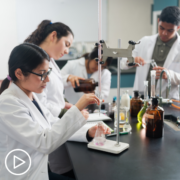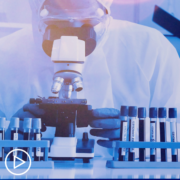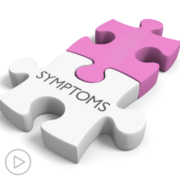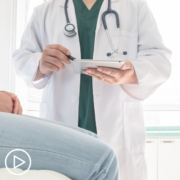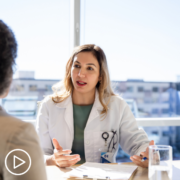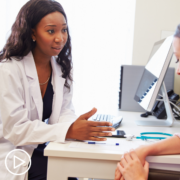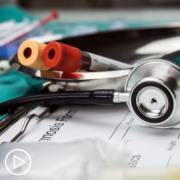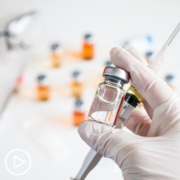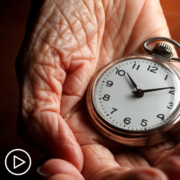Diagnosed with CLL? Start Here from Patient Empowerment Network on Vimeo.
What do newly diagnosed chronic lymphocytic leukemia (CLL) patients need to know? Expert Dr. Ryan Jacobs explains how CLL occurs and provides an overview of treatment types.
Dr. Ryan Jacobs is a hematologist/oncologist specializing in Chronic Lymphocytic Leukemia from Levine Cancer Institute. Learn more about Dr. Jacobs.
Download Resource Guide | Descargar Guía en Español
See More from START HERE CLL
Related Programs:
Transcript:
Lisa Hatfield:
There’s a lot going on in terms of novel therapies and new options. But before we jump into all of that, the tool box that’s expanding, can you introduce CLL and provide an explanation of what it is and what that means for a newly diagnosed patient?
Dr. Ryan Jacobs:
So chronic lymphocytic leukemia, or CLL, is the most common chronic lymphoma/leukemia. It is really both most of the time. It presents with what we call lymphocytosis, meaning the white blood cell count, and specifically the lymphocyte count is high or elevated. To call it CLL, to make that formal cancer diagnosis, we can generally take a patient’s blood sample and put it through a fancy machine that we call a flow cytometer, that looks for characteristic markers on the outside of the cells, and if there’s a bunch of those cells, we call that a monomorphic population.
So a bunch of those cells that look the same, and they’re B cells, that’s the type of lymphocyte count they are, and they’re over this threshold of 5,000. Then that is the diagnosis right there, we don’t need an invasive procedure. You generally do not need a bone marrow biopsy or a lymph node biopsy. There is in about 15 percent of cases, the disease presents with just in large nymph nodes, and the white count is normal. We call that small lymphocytic lymphoma. It’s considered an overlap with CLL, and I’ve had many patients that have started off with SLL and then eventually manifest elevated lymphocyte count later in their disease course. So it is considered an overlap, the treatment is the same for both of those disease entities.
So that’s the diagnosis of CLL and how it generally shows up initially. In a nutshell, it’s a cancer of the aging population, average age is 70. I have a lot of patients that ask me, “Why did I get CLL?” And the answer is, “We don’t know.” It’s that way with most cancers, unfortunately, we don’t know why one person gets a cancer and the other person doesn’t.
But it obviously has something to do with the aging effect on the DNA of the B lymphocytes because of how much more common it is as patients get older.
Lisa Hatfield:
We know that therapies are evolving faster, hopefully faster than patients are relapsing, which is a good thing. So when they do relapse, chances are there will be a new option for this patient. But a CLL cure still remains elusive.
So, Dr. Jacobs, if you can speak to…we’ll just jump right into some of the newer, the novel therapies and things that are being investigated with CLL treatment. If you can just speak to some of those newer therapies, the novel pathways and targets that are currently under investigation with CLL, we’d appreciate that.
Dr. Ryan Jacobs:
Sure. We’ve come a long way in how we are managing this common cancer that’s benefiting a lot of patients. And as mentioned, with this cancer being one that is more common in the older population, we do know that the population of the United States specifically is getting older, there’s going to be more 70-year-olds. So these breakthroughs are helping a growing number of CLL patients.
Before 2014, really outside of a clinical trial, the only way we could treat CLL Is with combinations of chemotherapy and an immune therapy, like a monoclonal antibody called rituximab (Rituxan), that was kind of our first, what we would call targeted treatment outside of chemotherapy that we had, and it was, like targeted treatments are, well tolerated. It was an antibody that targets B cells specifically.
So we were combining it with chemo, we would call that chemoimmunotherapy, and it helped a lot of CLL patients. But for many, those were poor prognostic markers in particular, and those with relapse disease, chemotherapy was not very helpful, and it was quite toxic in many circumstances.
So we’ve been fortunate that since 2014, we’ve had a lot of new treatment options, and they’re targeted therapies. It’s not like non-specific cytotoxic chemotherapy, these are treatments that have been developed with specific targets in mind that are unique to the B-cell neoplasm, the B-cell cancer, the CLL. And the first of these that really changed everything was a BTK inhibitor called ibrutinib (Imbruvica), that we got in 2014.
Initially, we can only use it in the relapse setting, but eventually, in 2016, we could start treating patients as a first line of therapy with ibrutinib. And then in 2019, we had a newer version of BTK inhibitor, we call those second-generation BTK inhibitors. That drug was acalabrutinib. And it eventually was shown in a head-to-head study to be just as effective as ibrutinib in a relapsed patient population, but it had less side effects than ibrutinib. So in, specifically, atrial fibrillation, hypertension. Cardiac toxicities overall were one that they really focused on in that study.
So as a whole, when we were choosing BTK inhibitors, we were shifting away from ibrutinib, shifting to acalabrutinib, and then just as…earlier this year, we had a third BTK inhibitor, zanubrutinib (Brukinsa), that was approved. It’s also considered a second generation BTK inhibitor like ibrutinib and acalabrutinib (Calquence). It treats CLL in the same way, in how it inhibits BTK or Bruton’s tyrosine kinase, that’s over expressed in CLL cells.
But it also has a favorable toxicity profile when compared head to head with ibrutinib, and now we have two second-generation options between acalabrutinib and zanubrutinib. And it’s not really easy for us to know between those two, which is “better.” When we decide to treat with a BTK inhibitor, we’re usually choosing between those two at this point, and we’re trying to personalize the decision for the patient, and there are some different factors they can get involved in that complicated decision.
Luckily, we are not limited to BTK as a target. I mentioned earlier, we have monoclonal antibody, rituximab like the one I mentioned, but a newer version of rituximab, a more potent version, obinutuzumab. Is one that we have available along with a Bcl-2 inhibitor, venetoclax (Venclexta). That is now, as of 2018, improved in the frontline CLL setting, also approved in the relapsed setting, of course, since 2016. And we use venetoclax with a monoclonal antibody like obinutuzumab (Gazyva), and together they are a very potent combination that cause pretty rapid cancer cell death, as opposed to the BTK inhibitors that more put the cancer to sleep and require daily dosing indefinitely for as long as the drugs work.
And remarkably, the data on BTK inhibitors tells us that should work for many, many years. They’ve been following some of the patients that got treatment in the first line setting, and eight years out, there’s still more than 50 percent of the patients are free of progression, so they can’t even quote an average response time yet. With eight years of follow-up on the early ibrutinib patients. The difference with venetoclax combined with a monoclonal antibody like obinutuzumab, is because it causes a more rapid cell death, you can give it on a time-defined schedule. So we tend to give it for one year in the first-line setting and two years in the relapse setting, and the antibody portion is just given for the first six months.
The BTK inhibitors and venetoclax are oral treatments, so that’s a big win for patients to avoid the infusion center for those treatments, but the IV antibody treatments will still require some trips to the infusion center if you’re doing that combination with venetoclax. For most patients, those two targets are what we’re choosing between, and we try to personalize the decision to the patient. And again, that’s a very complicated discussion on what is “best.” And we use things like the prognostic work-up, medical problems that the patients already have, medicines that patients are on, to help make the best treatment decision for our CLL patients. But those…for in terms of how well that treats the CLL, both of those are considered equivalent options for the large majority of CLL patients.
We’ve got some things on the horizon, but in general, those are two targets that we have at this point. There is for relapsed patients, PI3 kinase inhibitors that are still FDA-approved at this time, that aren’t quite as effective and more toxic, so we sometimes think about using one of those targeted therapies if a patient has already progressed on a BTK inhibitor in venetoclax class. In the future, we are looking towards combining BTK and Bcl-2 inhibitor. Like, for example, there’s been studies already done that I’ve put many patients on, with ibrutinib-venetoclax, and I believe there’s a question about that later.
There’s also an ongoing study that I have opened at my institution that’s looking at acalabrutinib and venetoclax. So taking these two pills together in a time-defined manner, so you don’t have to take the BTK inhibitor indefinitely. And then there are some therapies that have already been improved in other lymphomas, and we wonder if they’re going to have a role in CLL eventually. So we now have bispecific antibodies, so that’s taking a drug like rituximab or obinutuzumab and adding a T-cell engager to it, so it has two targets or it’s bispecific.
And we have that drug, mosunetuzumab (Lunsumio) available in follicular lymphoma and there’s several others in development, and we’ll see how their role comes into play in CLL as well. As well as CAR T-cell therapy, where we take a patient’s T cells and genetically engineer them to attack the cancer. That’s now an approved therapy for many different kinds of lymphomas and multiple myeloma as well.
So we wonder if that’s going to have a role in CLL. But I think for the foreseeable future, it’s going to be looking first at BTK and then Bcl-2 inhibition, or vice versa. And we don’t really know which is better to go first, we think they’re both…they can both be sequenced one after the other. And then maybe it will have some of these other breakthroughs coming in and helping for after patients need something beyond those therapies.
And there’s probably going to be a lot of patients that never need anything beyond those options, those initial couple of targets, because they do so well. I think in the most immediate future, the approval that is going to give us a new great option is going to be for an alternative site BTK inhibitor, or it’s also called a non-covalent BTK inhibitor.
And there’s this drug called pirtobrutinib (Jaypirca), it has been approved in mantle cell lymphoma and likely will get approved in CLL this year. And that drug specifically is a BTK inhibitor that still works even in patients that have, say, progressed on ibrutinib or acalabrutinib or zanubrutinib. That will be a new target available for CLL patients and probably pretty quickly become one of the go-to drugs that we use for relapsed CLL patients that have already been treated with a BTK…with a traditional BTK inhibitor. So growing number of options and it’s really great for our CLL patients.
Share Your Feedback
Create your own user feedback survey



Create your own user feedback survey


